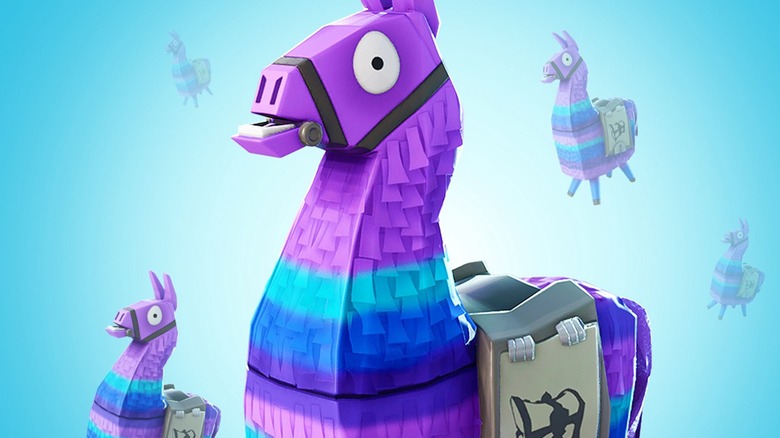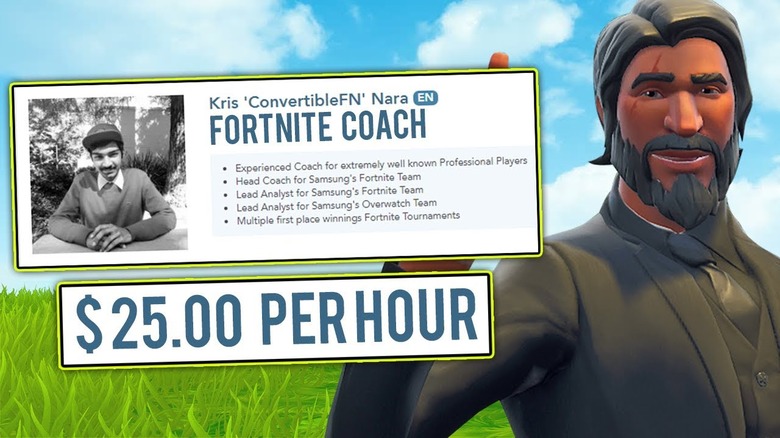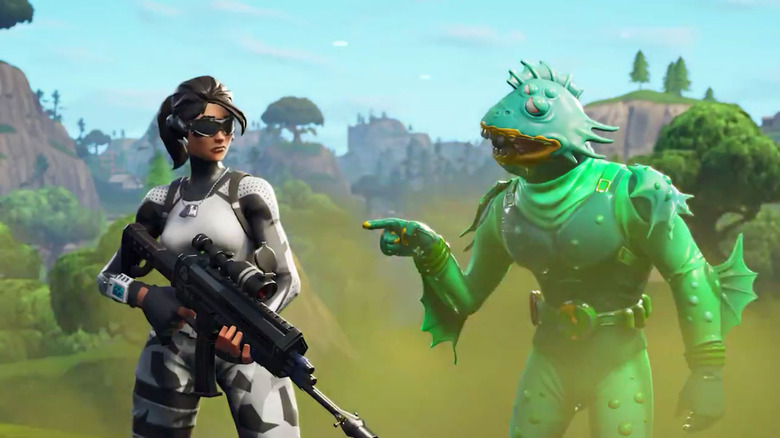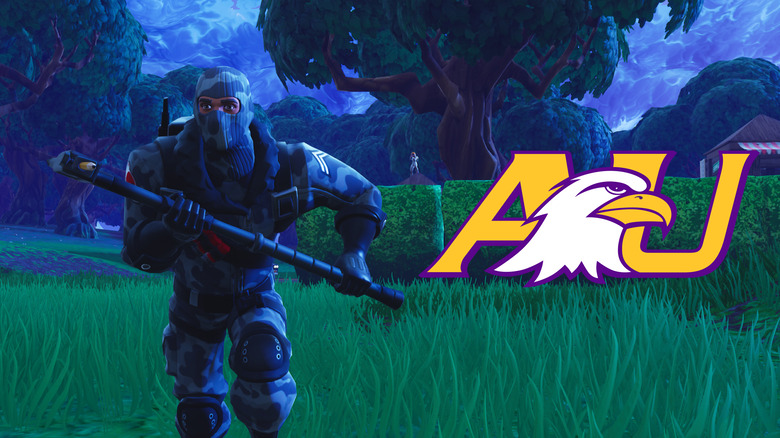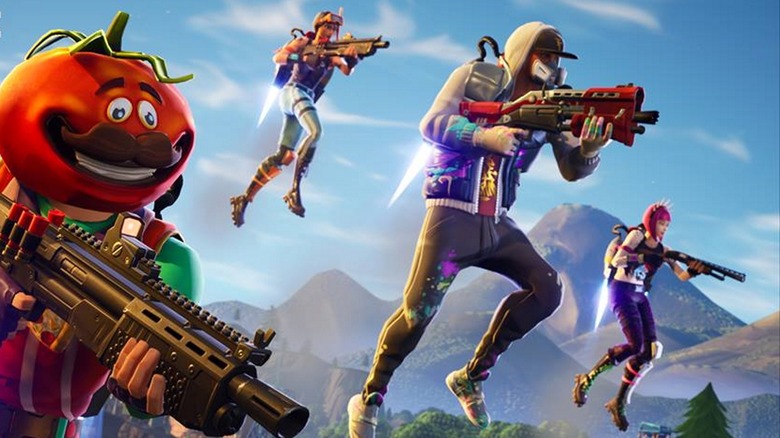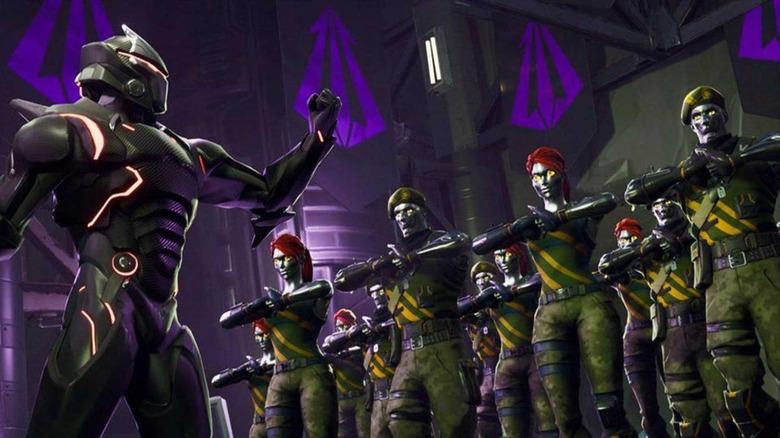The Untold Truth Of Fortnite Coaches
There's nothing quite like the thrill of victory, right?
It's a feeling that kids are introduced to pretty early, whether they're playing little league baseball, chess, or Fortnite. It's addictive. It feels good. And it's something to strive for. Because losing can sting, but it also serves as motivation. It sets the bar a little higher, and it challenges you to go reach it and get better so you can get back to the winning.
Little league baseball has coaches. Chess teams have coaches. So it's only natural that Fortnite has a coaching industry, too. And it's all over the news right now.
You've probably seen the stories about Fortnite coaches on news websites, or on your local news network as the anchors awkwardly make the same joke in 130 different cities. "My kid can't stop playing that game!" But the info you've gotten so far has, more likely than not, just scratched the surface. There's a lot more to the Fortnite coaches that are popping up seemingly by the second.
Some Fortnite coaches are current and former esports professionals ...
In the world of Fortnite coaches, there are two categories in terms of who you can choose. And if you're lucky, you'll land a coach who fits into the more preferable one: someone with experience as a professional gamer.
Why would you want a former pro as a coach? Because even if they played a shooter other than Fortnite, they have the base talent to be good at just about any of them. And hopefully, they can teach you, too.
Take Kris "ConvertibleFN" Nara, for instance. You'll find his services on the website Gamer Sensei, which helps connect wannabe pros with those who've competed at the highest levels. Kris used to play in tournaments, and also spent time as both the lead analyst and the head coach for Samsung's Fortnite team. That's some pretty relevant experience. And at a rate of just $25 an hour, you don't have to break the bank to learn from Kris, either.
... while others seem to be amateur players just cashing in on the trend
But there's another category of Fortnite coach that you have to be on guard for. The kind that will talk up their past achievements — say, winning tournaments — but might embellish their record of play. The kind that say they're "100% good enough to go competitive," but don't play professionally.
The kind that are simply looking to ride the wave of people looking for Fortnite coaches.
You'll find lots of players like this on Fiverr, which offers an easy way for people to offer and accept payment for coaching services. They often build profiles that speak of a high number of Victory Royales, or will highlight their experience with the game. But there's no real way for you to verify their claims. And the fact that many of these so-called coaches charge as little as $5 an hour should immediately set off alarms. You know the old adage: you get what you pay for. And the odds are good that a cheap coach won't improve your play much, if at all.
Some parents hope hiring a Fortnite coach can help their child win a scholarship
It's often said that esports could one day be just as big as traditional sports like football and basketball. And while we're not there quite yet, there are already a few large professional gaming leagues, as well as a host of major tournaments with huge cash prizes.
But that's not all. At least one college is getting in on the act, offering scholarships for its Fortnite team. And parents have noticed.
A new trend picking up steam is parents who hope that some Fortnite coaching can help their kids nab a scholarship from Ashland University. The school, located in Ohio, offers as much as $4,000 in funds to talented Fortnite players who commit to the university. That's not enough for a free ride at the school, but it's certainly enough to put a nice dent in the price of college, which continues to go up every year. And it can help put those kids in a position to play professionally for even bigger money in the future.
Other parents want their kids to get better so they aren't bullied at school
But there's a sadder side to the Fortnite coaching trend that has nothing to do with helping a child better afford college, or helping them improve their future earning prospects. It has to do with another subject that's been making the news as of late — one that's actually the focus for the current First Lady of the United States.
It's bullying. Sadly, some parents feel that their kids will be less prone to bullying if they're able to play Fortnite competitively against their peers.
"There's pressure not just to play it but to be really good at it," said one child's parent to The Wall Street Journal. That particular parent paid $50 to nab her ten-year-old a four-hour training session with a coach. The hope? That increasing his skill at the game would make him less likely to be ostracized by his classmates — a heartbreaking commentary on the effects of bullying, and the silly things that kids pick on each other for.
Some people have come to the defense of Fortnite coaches
To more casual gamers, the idea of hiring a Fortnite coach might seem crazy. You want to pay money to get better at a video game? Isn't the fun found in simply playing it? But not everyone feels that way. Some, in fact, actually see the merits in hiring a professional gaming coach.
Ben Kuchera of Polygon, for example, feels that games in general have gotten a bad rap, and that's part of the negative response many have toward Fortnite coaching.
"We don't lobby the 'go outside' criticism at kids who spend a significant amount of time reading or learning a musical instrument," Kuchera writes, adding, "Parents who spend thousands to train their prospective future Olympians are often seen as supportive, not as wasters of time and money."
He makes a solid point. At the very least, Fortnite could be viewed as a hobby that's no different than, say, collecting baseball cards or playing tennis. But while most won't bat an eye at the time and money investment others put into those activities, it does seem that anything video game related falls under far more scrutiny.
Others are skeptical about whether coaching can help someone become a pro gamer
That's not to say there aren't some good-faith arguments against Fortnite coaching in some situations. And in the case of Tom Ough, a writer for The Telegraph, he actually put the time in with an experienced coach to do some research.
His conclusion? Coaching could certainly help him improve, but it would by no means turn him into a professional player — the aim of many starstruck kids who look up to former pros like Ninja, Summit1g, and Shroud.
When you think about it, that finding shouldn't be all that surprising. In just about any other sport, players already come blessed with some innate talent. The ones who reach the pinnacles of success aren't coached into being good — rather, they're already good, and coaching merely polishes their game and makes them great. There are fundamentals that can be improved, of course. But Ough's coach found it difficult "to precisely articulate what it is that his talent is composed of," and there's good reason for that.
Some people are just born with it.
And some feel that kids who want to be coached in Fortnite are wasting their potential
The following fact should come as no surprise, especially if you grew up playing video games: some people see little to no value in them. And they certainly don't see gaming as a viable career. Hiring a Fortnite coach? That's lunacy. In fact, why play video games at all when you can bury your nose in a science book? What if your destiny is to grow up and cure cancer?
That seems to be the argument highlighted in a piece by Variety, which right in the headline sees a "problem" with Fortnite and competitive video games in general.
The Variety article isn't the first one to paint video games in a negative light, and it certainly won't be the last. But its premise — that gamers are wasting precious brain space by wanting to win more at video games — seems flawed. It tosses aside any notion that people can be just as passionate about video games as, say, a violin player is at practicing his or her craft. And that people who take the step to hire a Fortnite coach and improve are only doing so because they haven't heard their higher calling yet.
There are plenty of things to criticize about video games. This isn't one of them.

